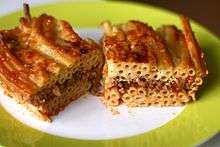Pastitsio
 | |
| Course | Pasta |
|---|---|
| Place of origin | Greece |
| Main ingredients | ground beef, béchamel sauce |
|
| |
Pastitsio (Greek: παστίτσιο, pastítsio; [paˈstitsço], from Italian pasticcio),[1] sometimes spelled pastichio, is a Greek and Mediterranean baked pasta dish that contains ground beef and béchamel sauce.
Name and origin
Pastitsio takes its name from the Italian pasticcio, a large family of baked savory pies which may be based on meat, fish, or pasta.[2] Many Italian versions include a pastry crust, some include béchamel.[3] The word pasticcio comes from the vulgar Latin word pastīcium[4] derived from pasta, and means "pie", and has developed the figurative meanings of "a mess", "a tough situation", or a pastiche.[5]
Greece

The typical Greek version has a bottom layer that is bucatini or other tubular pasta, with cheese and egg as a binder; a middle layer of ground beef, veal or lamb with tomato and cinnamon, nutmeg or allspice; another layer of pasta; and a top layer of sauce, varying from an egg-based custard to a flour-based Béchamel or a Béchamel with cheese (known as Mornay sauce in France). Grated cheese is often sprinkled on top. Pastitsio is a common dish, and is often served as a main course, with a salad.
Cyprus
In Cyprus a similar dish is called "oven macaroni" (Greek: μακαρόνια του φούρνου, makarónia tou foúrnou.[6] It is an essential dish during weddings and celebrations such as Easter, where it is served along with spit roasted meat. Recipes vary, but usually the meat sauce in the middle is made of pork, tomatoes are only sometimes used, and it is flavored with mint, cinnamon and parsley. The top is sprinkled with grated halloumi or anari cheese, though cheese is sometimes added only to the white sauce.[6][7]
Egypt
Macaroni Béchamel (Arabic: المكرونة البشاميل, al-makarūnah al-bashāmīl) is the Egyptian version. It is typically made with penne pasta, a layer of cooked spiced meat with onions, and Béchamel or Mornay sauce.
Malta
In Malta, Timpana (the name probably derived from Timballo) is made by tossing parboiled macaroni in a tomato sauce containing a small amount of minced beef or corned beef, bound with a mixture of raw egg and grated cheese. Hard-boiled eggs are sometimes added. The macaroni is then enclosed in a pastry case or lid before being baked.
See also
References
- ↑ Babiniotis, p. 1354
- ↑ Accademia Italiana della Cucina, La Cucina: The Regional Cooking of Italy, pp. 310–313
- ↑ Vincenzo Buonassisi gives 41 kinds in Il Nuovo Codice della Pasta, Rizzoli 1985; see also Touring Club Italiano, Guida all'Italia Gastronomica, 1984.
- ↑ "Pasticcio". Vocabolario della lingua italiana. Treccani. Retrieved 5 March 2014.
- ↑ Oxford Paravia Italian Dictionary, 2001, ISBN 0-19-860437-8
- 1 2 "Μακαρόνια του φούρνου". foodmuseum.cs.ucy.ac.cy (in Greek). Cyprus Food Virtual Museum. Retrieved 26 November 2015.
- ↑ Greek Mediterranean Cuisine
Sources
- Μπαμπινιώτης (Georgios Babiniotis), Γεώργιος (2005). Λεξικό της Νέας Ελληνικής Γλώσσας [Lexikon der Neugriechischen Sprache] (Β' Έκδοση ed.). Κέντρο Λεξικολογίας. ISBN 960-86190-1-7.